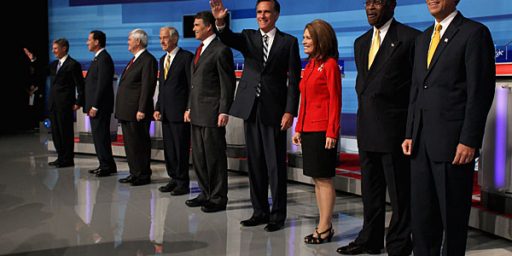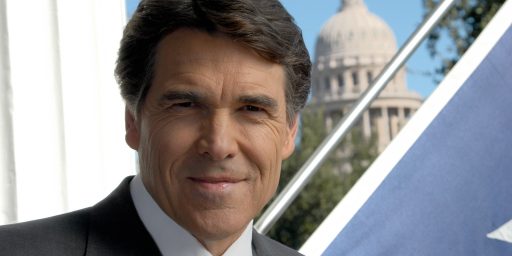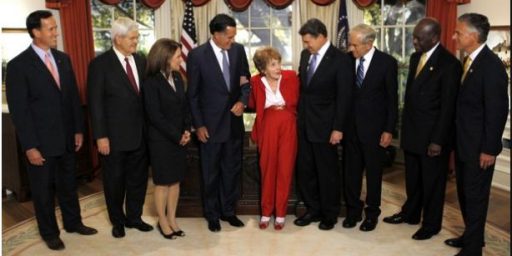Does Debate Performance Matter?
These debates matter (if by "matter" we mean "affect the views that voters have of the candidates").
 Yesterday, Doug Mataconis asked: Does A Bad (Or Good) Debate Performance Prove Anything?
Yesterday, Doug Mataconis asked: Does A Bad (Or Good) Debate Performance Prove Anything?
My answer to the exact question as asked: no, it doesn’t prove much of anything. I prefer the question to be asked as follows: “does a bad (or good)debate performance prove anything matter?(fixed to reflect what I meant to type).”
There are at least two basic ways to answer that question. The first is whether the debates actually mater in terms of telling us anything about a given candidate’s ability to run for office as well as their ability to serve. The second is an empirical question of the political impact of debate performance.
The first question requites a somewhat subjective response and is complicated by the two factors noted above in regards, specifically, to primary elections: voters are evaluating candidates on their ability to both run in the general election as well as to serve in office. At this early stage of the game, the former is likely more important to voters than is that latter at this stage. We are still months away from any real votes being cast. As such, poor performance in debates is clearly going to matter to primary voters who want to choose a candidate who can be seen as capable of making a serious run in the general election (the dreaded “electability” dimension). Primary voters also want to hear about the candidate’s policy views (which speaks to how the candidate will allegedly govern).
Perry’s latest debate performance impacted (negatively) both of these areas. His tongue-tied attempt to take down Romney raises questions his ability to campaign (and, more to the point, his ability to stand on a stage next to a sitting president* and adequately compete with him). In terms of policy, Perry said some things (on immigration in particular) that does not resonant with large segments of the GOP primary electorate.
As such, I think that Perry’s debate performances have mattered.
On the empirical front, political scientist Charles Franklin has looked at the polls and have noted that the Perry v. Romney contest has narrowed after each debate (and his figures do not take into the most recent debate):

It will interesting to see, from an empirical point of view, if this trend continues.
Franklin further weighs in in the following post: Has Perry Support Declined? (lots more graphs—so do click through).
So, in sum, yes: these debates matter (if by “matter” we mean “affect the views that voters have of the candidates”).
Now, I suppose we could argue about whether this could be the case or not, but that is another issue.
—
*I know a lot of readers are so anti-Obama that the assumption is that anyone can compete with him. But it has to be remembered that there is a great difficult for any challenger to have to stand on a stage with POTUS. No one should pretend like Obama’s resume is insufficient (the “community organizer” card is utterly irrelevant now). Any candidate that the Republicans nominate has to be in a position to convince a large number of voters that said candidate is an adequate replacement for the current occupant of the White House. This is harder than it looks. There is a reason why incumbents have a fairly high re-election rate.






They matter primarily because it’s what media people, bloggers and whatnot talk about for days and weeks to follow, and that directly effects the perceptions of voters. Very few people watch debates, as a share of the electorate, but the people who are information gatekeepers almost all watch them, and talk about them to their audience.
As I said below Perry’s problem was not so much about how he said it but what he said, specifically about immigration.
The debates end up mattering because the media tells voters that they matter. For days after one of these debates all the political chatter — even on networks that didn’t carry said debate — will be about the debate, who “won,” who “lost,” and who made the biggest gaffes. It’s inevitable that that kind of media coverage is going to have an impact on the race at some point since the media is where most voters get their information.
The question is whether this should be the case, or perhaps more properly whether these debates, including the debates run by the Commission on Presidential Debates, are serving their purported purpose. As I touched on in my own post, I think the answer is probably no.
@Doug Mataconis: I agree that media coverage matters (this is why I used the word “narrative” rather prominently in my two posts about Perry).
However, I will say that the ability of the media to shape the narrative is influenced by what the candidates actually say. In other words: the media can’t create the narrative out of whole cloth–they have to have something to work with.
There is a phrase I’m forgetting right now, “rational ‘something'”, which says that it’s rational for busy people to ignore politics (or whatever) and focus on more pressing concerns.
It’s possible that the debates, and even the primaries, outsource the first filtering, so that when the bulk of people turn their attention, they have narrowed choices.
Of course, the dark side of that might be that the irrationally over-focused (and secondary media) have a strong role in early filtering.
“The television ratings for last night’s Republican debate in Florida show that 4.9 million folks watched ….”
@Doug Mataconis:
I am not sure it matters what the purported purpose is, to be honest. The issue would be, to me, as to what the actual results/impacts are rather than anything else.
The fact that the debates (like all speeches) are filtered thought the media is incontrovertible, but that is just part of the process, yes?
BTW
I’m having a hard time seeing anything other than changes in capitalization and spacing 😉
Ah, Rational Inattention.
@re: Ron B: Sunday, September 25, 2011 at 12:18:
I think both mattered in this case. What he said was important and it impacted him negatively, but Perry also came across as not fully prepared for the debate. So how he said it mattered as well.
Perry even mentioned afterwards that the GOP should not look for the best debater. Both his message and the manner in which he conveys it are important. The former to conservatives who want a solid conservative candidate, and the latter by anyone concerned that a poor performance against Obama, or even a mediocre one, will be torn apart by a partisan press.
I’m not inclined to support Romney during the primary, but I will give him this: he is polished in the debates and would have an easier time against BO.
@Steven L. Taylor:
The process is what it is, so the best we can do is talk about how it affects the race. Nonetheless, I think its legitimate for us, and the media, to wonder if debates like these are serving any useful purpose outside of giving the talking heads something to talk about other than the latest missing blond cheerleader.
“The media” are not the only gatekeepers here. Other gatekeepers include the political cognoscenti and partisans. That is, people who keep themselves well-informed and follow poltics closely. Their perceptions shape the perceptions of their friends and family and so forth, contributing to a candidate’s image among the wider electorate.
@Doug Mataconis:
That’s certainly fair. I just think (as I think you are likewise acknowledging) that the issue of what the debates ought to be and what they are are two analytically distinct questions.
I do think that is goes beyond simply cheerleaders and talking heads, as voters do form opinions based on these events (and the soundbites they generate).
Does it affect the view of voters? Yes.
Does it represent the ability of the candidate to be President? Not so much.
Same may say it’s important but this doesn’t change the results much. Maybe percent here there, but that’s it.
@john personna: Rational ignorance is what political scientists call this.
As I’ve noted many times, I’ve largely skipped these debates and various presidential speeches for years now. I’ll watch the general election debates and may catch one or two of the GOP debates as the field narrows. But I figure I’m unlikely to learn anything from investing family time watching these insipid things that I can’t glean in a few minutes the next morning.
@James Joyner:
Thanks, just looking at the two phrases, rational ignorance seems slightly more pessimistic than inattention. One would hope that people would be less attentive early in the election cycle, but strive to catch up later. But the dark side is that some might not, that they might vote “mental shortcuts” right on through.
@Doug Mataconis:
BTW — you (Doug, James, Stephen, et al) are part “the media”(*) — not broadcast media — but there’s no question that as a blogger at a high trafficed niche political site you represent an important type of media. And in fact, through your posts, you are also contributing to the overall media narrative.
(*) – If we’re playing language/media theory we could say anyone who talks about this is part of a media web. I’m not using “media” in that way.
Yes. And there’s a reason why incumbents have a dismal re-election rate when unemployment pushes 10%. FDR managed to get re-elected (a few times) with such a high unemployment rate, but nobody else comes to mind.
@Max Lybbert: True. But of course that has nothing to do with the point I was making.
I thought the point you were making in that footnote was “I know a lot of readers are so anti-Obama that the assumption is that anyone can compete with him. But it has to be remembered that there is a great difficult for any challenger to have to stand on a stage with POTUS.” And the fact that sitting presidents are very vulnerable when unemployment is high does, in fact, have a lot to do with that point.
@Max Lybbert:
That has to do with the ability of said POTUS to be reelected. However, the candidate who challenges said POTUS still needs to be able to project an ability to replace him. That would be the point.
I certainly concede that the economy is a huge problem for Obama’s re-election, and therefore this helps whomever the GOP nominates. It does not obviate, however, the fact that the challenger still has to go toe-to-toe with the sitting President of the United States, which is a formidable challenge even during a bad economy.